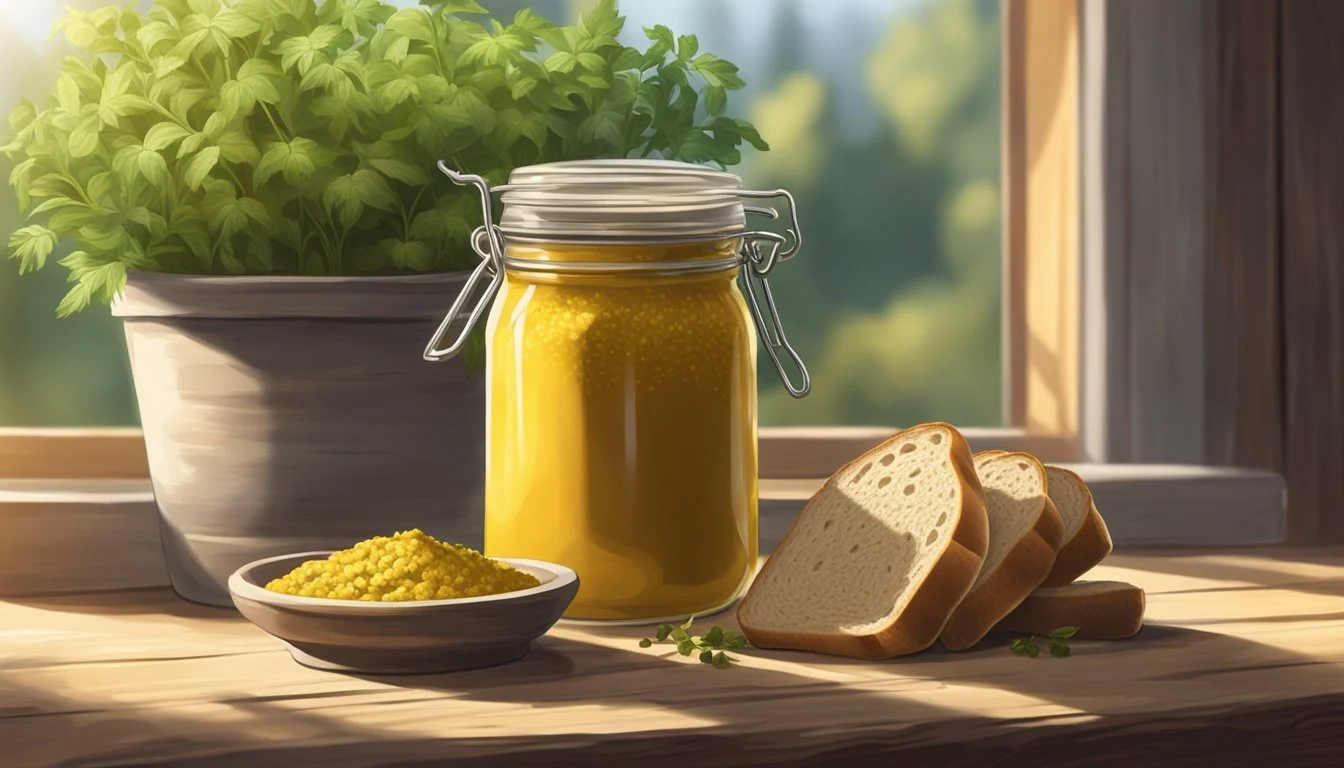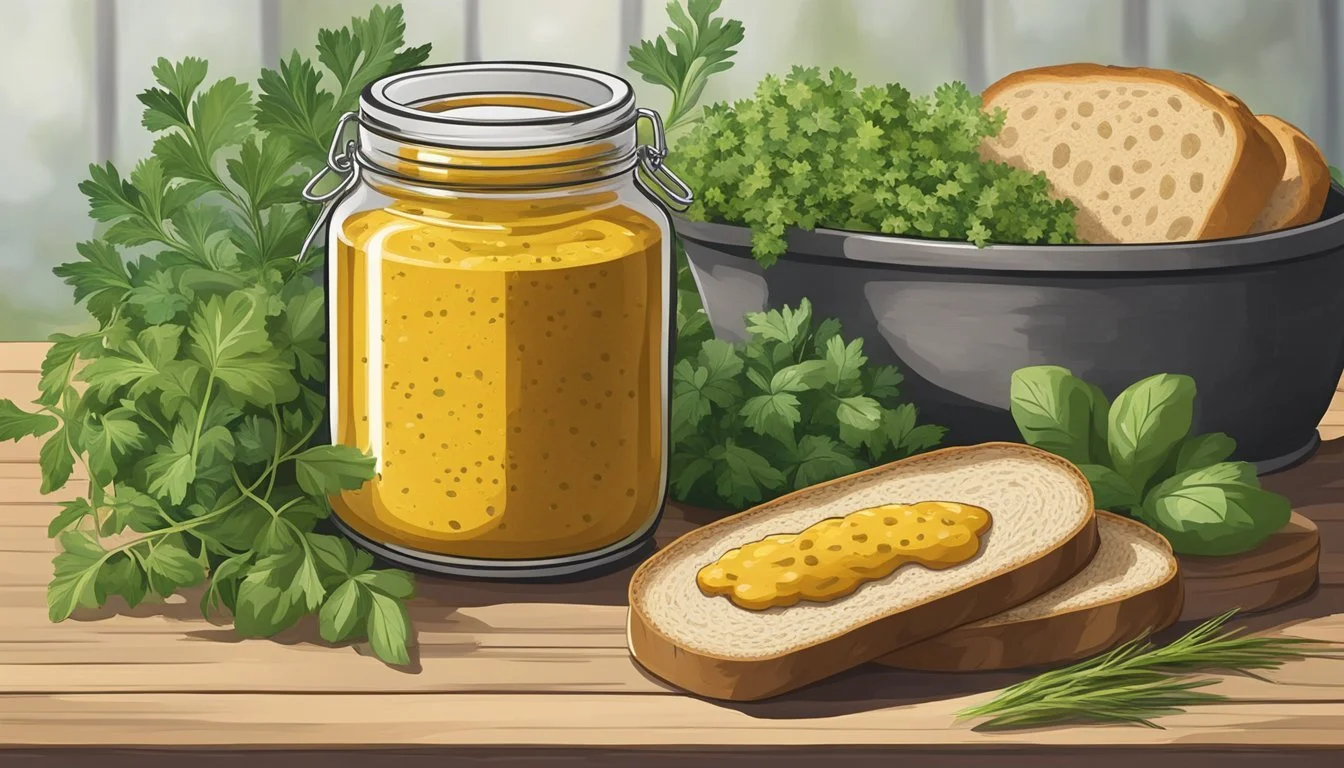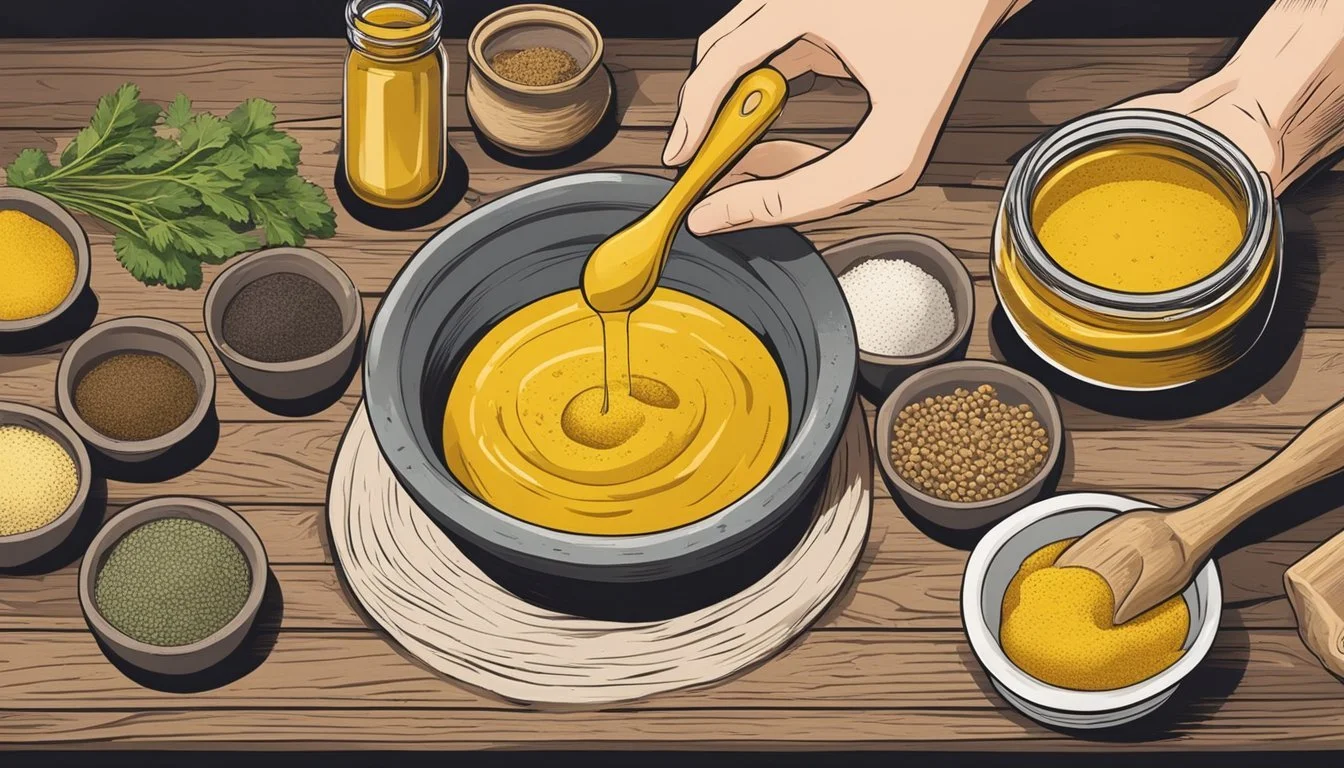Stoneground Mustard Substitutes
Top Alternatives for Your Recipes
When a recipe calls for stone ground mustard, it's seeking the distinct flavor and texture this condiment provides. Stone ground mustard, known for its coarse grind and robust flavor, often contains partially ground brown mustard seeds and may include wine instead of vinegar, distinguishing it from other mustard varieties. The unique characteristics of stone ground mustard make it a favorite in marinades, dressings, and as a flavorful accompaniment to meats and cheeses.
However, one might not always have stone ground mustard on hand, or perhaps dietary restrictions necessitate an alternative. Fortunately, there are several suitable substitutes that can mimic the flavor and texture of stone ground mustard. Among these are Dijon mustard, known for its similar use of brown mustard seeds and a smooth consistency, and yellow mustard, which provides a milder taste. These substitutes can be used in cooking or as a component of sauces and vinaigrettes, ensuring that the absence of stone ground mustard does not compromise the intended flavor profile of a dish.
Understanding Stone Ground Mustard
Stone ground mustard is a condiment that stands out due to its unique production process and the flavorful end product it creates. It balances a blend of spiciness, tanginess, and a distinctive texture high in gustatory appeal.
Origins and Varieties
Stone ground mustard originated in regions like Germany and France, where mustard has been a staple in cuisine for centuries. This condiment is primarily made from brown mustard seeds or sometimes black mustard seeds. Each variety yields a slightly different flavor and spiciness level.
Flavor Profile
The flavor of stone ground mustard is robust, often described as spicy and tangy, with a subtle bitterness. It's less processed than other mustards, which allows the true taste of the mustard seeds to come to the forefront.
Texture and Appearance
In terms of texture, stone ground mustard is known for being coarser compared to creamy mustards. It retains some of the seed's original form which contributes to a more rustic mouthfeel. The appearance is typically less vibrant than yellow mustards due to the use of darker seeds, resulting in a more muted yellow color.
Health Benefits
Stone ground mustard contains antioxidants due to the presence of compounds like glucosinolate, and it is known for its anti-inflammatory properties. Additionally, it provides vitamins and minerals which contribute positively to a balanced diet.
Common Stone Ground Mustard Substitutes
When seeking a substitute for stone ground mustard, one should consider the desired flavor profile and texture in the final dish. The alternatives range from other prepared mustards with similar seeds to spices that can emulate the heat and tang of mustard.
Prepared Mustard Varieties
For a stone ground mustard substitute in recipes, various prepared mustards can fulfill the role effectively. Dijon mustard is a reliable choice as it often shares a similar base of brown mustard seeds. It lends a smooth yet piquant touch to sauces and vinaigrettes. Spicy brown mustard, another prepared mustard, offers less acidity, which closely mimics the zest of stone ground mustard in savory dishes.
Yellow mustard, although milder and creamier, can serve as a stand-in when others are not accessible.
Honey mustard presents a sweeter alternative, appropriate for dressings and glazes.
Whole grain mustard retains the texture of stone ground mustard, suitable for robust meat and cheese pairings.
Using Seeds and Spices
When no prepared mustard is on hand, mustard seeds constitute the base ingredient and can be ground to match the texture and flavor intensity of stone ground mustard. By controlling the grind, one can achieve the preferred coarseness or fineness.
To grind mustard seeds, one may utilize a mortar and pestle or a spice mill.
Horseradish, wasabi powder, or turmeric can substitute for mustard's heat and color in a recipe but lack the depth of mustard's flavor.
Alternative Condiments
Besides mustard-based options, other condiments can impart complementary flavors:
Mayonnaise can be used for its creaminess in dressings or as a sandwich spread, albeit without the sharpness of mustard.
Horseradish offers a potent kick, especially in sauces where a bold spice is desired.
In some Asian-inspired dishes, wasabi adds a similar heat to that of mustard, bringing an exciting layer to the palate.
Substitute Incorporation Techniques
When it comes to replacing stone ground mustard in recipes, one must not only consider flavor compatibility but also the impact on texture and moisture content. The incorporation techniques below will guide cook in using substitutes effectively to achieve a dish that honors the original's spirit.
Preparing Homemade Mustards
For those seeking to make their own stone ground mustard, whole mustard seeds can be soaked in a mixture of vinegar and water, often enhanced with white wine vinegar for a deeper flavor. Once soaked, these seeds can be partially crushed to replicate the stone ground mustard's consistency. If desired, sugar or honey can be added for a hint of sweetness, complementing the mustard's natural heat.
Adjustments for Taste and Consistency
To mirror stone ground mustard's unique attributes, cooks may need to adjust the flavor and texture of the substitutes. For a sweeter touch, honey or sugar can be incorporated. If a recipe requires a thicker texture, reducing liquid components or adding a thickening agent might be necessary. Conversely, for a thinner consistency, incorporating a small amount of water or vinegar could suffice.
Cooking with Substitutes
When utilizing ground mustard substitutes in cooking, it's crucial to consider the cooking method and timing. Prepared mustard can be added directly to marinades, sauces, and salad dressings. However, for cooked dishes like mac and cheese or roast beef, it's best to add the substitute early in the cooking process to integrate the mustard flavor thoroughly.
Pairing with Foods
Substitutes for stone ground mustard should complement the food's overall flavor profile. For example:
Honey mustard: Ideal to drizzle over chicken or pork.
Dijon mustard: Works well in salad dressings or as a spread in sandwiches and burgers.
Spicy brown mustard: A robust pairing for sausages and hot dogs.
In cheese pairings, consider the boldness of the cheese; milder mustards suit delicate cheeses, whereas stronger flavors can stand up to aged cheeses.
Conclusion
When it comes to finding a substitute for stone ground mustard, one has several viable options to consider. Each alternative offers a unique flavor profile and texture that can complement different dishes. The seeds of mustard plants are the foundation of stone ground mustard and can be used in a pinch by grinding them at home.
Suitable Substitutes:
Mustard Seeds: Grind to desired coarseness for a direct replacement.
Wasabi Mustard: Adds a horseradish-like kick, suitable for sauces.
Horseradish: Shares a similar heat, can be grated and balanced with vinegar.
Prepared Mustards (e.g., Dijon, Yellow): Combine with whole mustard seeds for texture.
Substitutes may vary in their intensity and flavor, so one should consider the specific condiment role stone ground mustard plays in the recipe. The selection process should emphasize a balance between taste and consistency to achieve the desired result.
Proper storage of these substitutes in a tightly sealed container in the refrigerator helps preserve their quality. Check labels for specific shelf life but expect several months of use from most substitutes. Always perform a taste test before adding to a recipe to ensure compatibility with the dish's flavor profile.
Choosing a substitute for stone ground mustard is straightforward; by understanding the alternatives available, one can confidently adapt recipes without compromising on taste or texture.
Additional Tips and Considerations
When exploring substitutes for stone ground mustard, one should consider factors such as labeling practices, product quality, and appropriate storage methods to maintain freshness and flavor integrity. Accurate measurements are crucial in recipe adaptation, especially when using a substitute in smaller quantities.
Label and Quality Check
One should carefully read labels when selecting a suitable stone ground mustard substitute to ensure that the ingredients align with the recipe's intended flavor profile. For instance, a recipe may call for a stone ground mustard that has whole mustard seeds for a unique texture and pungency. Quality is another aspect to scrutinize. High-quality substitutes can closely mimic the desired tang and complexity of authentic stone ground mustard.
Storage Tips
Storage is crucial for preserving the shelf life and quality of mustard substitutes. An unopened container of mustard substitute can typically be stored in a cool, dark place. Once opened, it should be sealed tightly and kept in the refrigerator to preserve its flavor and prevent spoilage. Homemade substitutes should be used within a week and kept in airtight containers.
Small Quantity Use
When a recipe calls for a small amount, such as a teaspoon of stone ground mustard, precise substitution is key to maintaining the recipe’s balance. If a teaspoon of stone ground mustard is replaced with a milder prepared mustard, one could incorporate a few whole mustard seeds to impart the rustic quality of the original ingredient. Measuring out small quantities accurately will ensure that the substitute serves its purpose without overwhelming the other flavors in the dish.
Glossary of Terms
In exploring stoneground mustard substitutes, it is crucial to understand the terminology related to mustard varieties, preparation methods, and culinary applications. This glossary provides clarity on essential terms and practices that inform the use of mustard in cooking.
Essential Mustard Terms
Stoneground Mustard: This variety contains partially ground brown mustard seeds, often with a coarse texture and can be combined with wine or vinegar.
Vinegar: An acidic liquid used in mustard production, providing tanginess and acting as a preservative.
Turmeric: A spice occasionally added to mustard for color and its earthy flavor.
Condiment: Stoneground mustard falls under this category, being a substance such as a sauce or seasoning added to food to enhance flavor.
Cooking Techniques
Dry Rub: A mixture of spices, potentially including ground mustard or substitutes, applied to food before cooking to infuse flavor.
Wet Rub: Similar to a dry rub, but includes wet ingredients like vinegar or other sauces, which can interact with mustard substitutes to create a paste for flavoring.
Marinades: Liquid solutions, often containing vinegar or spices, used to soak food before cooking; mustard or its substitutes can be integral to a marinade's flavor.
Culinary Uses
Sauces: Mustard, including stoneground mustard, contributes a pungent flavor to sauces, and when substituted can alter a sauce's texture and taste.
Spices: These are seasonings with aromatic properties used to flavor food; ground spices are common mustard substitutes.
Recipes: Lists of ingredients and instructions for making a particular dish; knowing appropriate mustard substitutes helps in modifying recipes without compromising the intended flavor.
Dishes: The foods or meals made following a recipe where stoneground mustard or its alternatives can add a unique taste profile.








